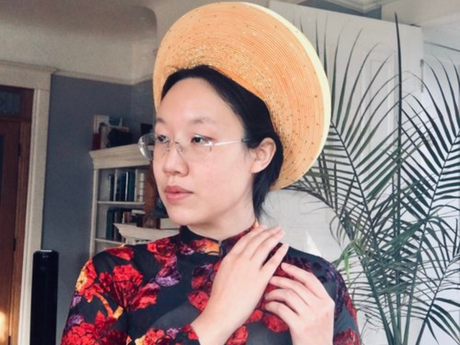In Their Own Words
Sophia Terazawa on “Stay”

Stay
For the muse could not
light another city
with her eyes, you spoke
anon, oil black like mine,
and whoever crossed
that cobbler’s
bridge in Ljubljana
would also speak of roots.
So stay, I said. Or kiss
me. No one’s
watching, beloved,
but a night
placed
at the far, far end of it.
From Anon (Deep Vellum, 2023). All rights reserved. Reprinted with the permission of the publisher.
On “Stay”
“Stay” is the last poem I wrote for Anon, which opens the collection. It’s a ‘good-bye’ placed on the first rung of a love story. An echo.
I’ve been told my poems feel like walking uphill. The breath slips away from the start, like learning how to kiss, like kissing and crying at the same time.
Let me tell you another story. Not long ago, I went for a walk in Ljubljana. After about twenty minutes, I felt dizzy. I was going to faint, so I said, “Let me sit down. Here.”
I laid myself on the ground in front of a tree stump. You knelt, worried, next to me. You asked if you could hold my wrist. It was April, raining. It seemed my heartbeat was flowing into the earth, I was chanting syllables—ah, ah—for the gibbons disappearing, for my mother disappearing, for the music of her country disappearing. You smiled. This was how Anon came to be, how breath would keep me alive when my heart couldn’t hold it any longer. I wrote to sing.
If it’s not clear by now, you should know I’m a bit dramatic around topics of love. Anyone who loses a tongue, centuries after losing a country, might relate to that sentiment.
“Stay,” therefore, is a greedy poem. It speaks to a singularly exiled voice. You, the pronoun, must bear some responsibility for its imperative; the verb “stay” becomes a motion between present and future tenses. Adverbs fall away to hold “stay” close to the throat. A lover can’t beg of you: “Please stay forever” without wanting to die! A boat of refugees can’t stay happily in the water. A dog can’t stay dutifully without a master. You can’t stay quietly in a different body without wanting to kill it. Extremities of staying, such as those, can be found near the roots of trauma, but this is an old, old story.
Let me tell you something else.
“Stay” closes with an echo of nighttime “placed / at the far, far end of it.” I wrote every poem before that, for Anon at night, kissing my wrist, asking you to stay.



